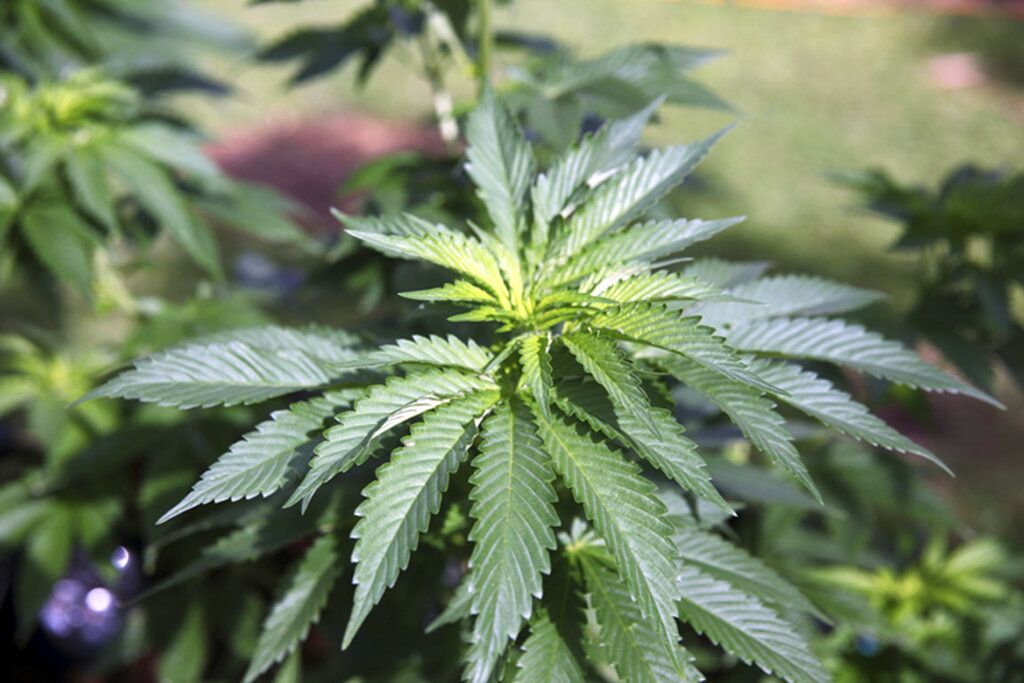"For the next several years, the state will take the first $20 million of the annual excise tax revenue for research into the health and social impacts of marijuana."
And the mystery of why the taxes wont cover the costs is.....? 
Marijuna taxes not the boon some expect
AP Photo This Feb. 17, 2016 file photo shows marijuana plants at a home in Honolulu. A growing majority of Americans say marijuana should be legal, underscoring a national shift as more states embrace cannabis for medical or recreational use. Illinois lawmakers working to legalize recreational marijuana have hit a potential snag: whether to allow people to grow a few pot plants for personal use. The 10 states that have legalized recreational marijuana have different "home grow" rules, with Michigan allowing individuals to grow as many as 12 plants and Washington state not allowing them to grow any. Home grow opponents say it fuels the black market. Proponents say people should be able to grow it if businesses sell it.
ALPENA — Despite the arguments of some proponents and misconceptions of some voters, it appears legalization of recreational marijuana will not solve the financial ills of schools or local governments.
It will have a limited impact on roads across the state, as well.
Most will welcome tax revenue generated by the sale of marijuana, but large sums of money will still need to be pumped into education and street repairs, area officials said.
Municipalities should also brace for the possibility that current marijuana tax revenue projections could be too lofty.
Proposal 1, the November 2018 ballot question through which voters legalized the sale, possession and use of marijuana in Michigan, guaranteed that marijuana buyers will pay the normal 6% Michigan sales tax. Most of that revenue goes to schools.
The new law also set a 10% excise tax on the sale of the drug. That revenue is promised to roads, schools, and the general funds of communities that allow recreational marijuana businesses to operate in their boundaries.
But, based on current projections, that revenue will not equal major windfalls for anyone.
For the next several years, the state will take the first $20 million of the annual excise tax revenue for research into the health and social impacts of marijuana. What’s left will be divided this way:
∫ 35% will go to the state’s education budget, which is divvied up among school districts around the state,
∫ 35% will go to the state roads budget, which is used by state roads agency and public works departments in counties and local governments,
∫ 15% will go to municipalities that allow marijuana businesses,
∫ and 15% for the counties where those municipalities reside.
The state Senate Fiscal Agency estimates that, for the state’s 2020 fiscal year that begins Oct. 1, total tax revenue from marijuana will be about $82 million. Of that, $59 million is projected to be from sales tax — a paltry sum for the more than $12 billion School Aid Fund – and about $23 million is expected to come from the excise tax, to be divided among the state’s hundreds of school districts and amongst some of the state’s 1,773 municipalities, and 83 counties.
Even if marijuana tax income grows to $182 million by 2023, as the Senate Fiscal Agency projects, that would equate to just $17,699 per municipality and $292,771 per county.
That’s not much to most government budgets. The City of Alpena, for example, took in $9.9 million in fiscal 2018. Alpena County took in $9.3 million.
It’s difficult to project the actual amounts each government would receive, because the money will be doled out based on the number of marijuana businesses open in a county. So far, more than 400 municipalities have prohibited marijuana businesses – including Alpena and Alpena Township — and will not be eligible for a cut of the excise tax. When governments prohibit marijuana shops, that reduces the number of places people can purchase marijuana, which could drive down sales.
It’s also difficult to project school revenue, since the state pays schools based on enrollment. If the $182 million were handed out equally, each school system would receive $96,592. However, districts like Alpena Public Schools would receive far less, because more money would go to districts such as those in Detroit, Lansing or Grand Rapids, which have far more students.
APS has a roughly $42 million annual budget.
The state’s road fund would increase by $56.7 million if $182 million in marijuana tax comes in.
INFLATED PROJECTIONS?
Some, however, believe those projections are inflated.
One of those people is state Sen. Jim Stamas, R-Midland, who represents Northeast Michigan.
Stamas is chairman of the governing board for the Senate Fiscal Agency and chairman of the state Senate Appropriations Committee. He said people and municipalities should not depend on the excise tax revenue to be a big financial boom, at least for the first year or two.
“Everybody needs to remember, these are only projections, and, over the next few years, we’ll be able to see how the growth goes across the state,” Stamas said. “Right now, I think the numbers are high, especially for the first year, and then it will sort of be a wait-and-see approach for beyond that.”
Based on the 2019-20 estimates of $23 million in excise tax revenue, municipalities would receive only $327 and counties $5,421. Each school system would get $1,800. That’s if the money were divided equally. Again, more money would go to cities with more marijuana businesses and to schools with more students.
About $1 million would be added to state road funding.
In May, voters overwhelmingly rejected Alpena Public Schools’ request for a $63 million bond project that would have funded widespread renovations on area schools. Before the election, many people said on social media that the bonds weren’t needed because the schools would get so much money from the marijuana tax. But it’s clear from current projections the district would only receive a fraction of a fraction of the amount officials requested.
APS Superintendent John VanWagoner said he doesn’t believe that train of thought caused the proposal to fail, but said it is important for taxpayers to know marijuana revenue will not come close to what’s needed to make the improvements officials say the schools need.
The superintendent said too many people think the financial benefits in Michigan will mirror those in places like Colorado, but he cautioned people against making those comparisons, because Colorado has a higher excise tax, 15%, than Michigan.
“It isn’t going to generate the type of money people think, and it will be far less than what the lottery contributes,” VanWagoner said. “I think there is a large misconception out there about how much of an impact (marijuana) will have on the schools, municipalities and roads.”
The Michigan lottery provides about $940 million for schools in the state.
‘A LOT OF INTEREST’
Josh Hovey, who was employed by the Regulate Marijuana like Alcohol group during the campaign for legalization in Michigan, is now employed by Michigan Cannabis Industry Association. He said he expects municipalities that already allow medical marijuana sales – marijuana was legalized for medicinal purposes in 2008 — to also allow recreational pot businesses. He said he also believes other communities who have prohibited marijuana sales will sit on the sidelines for a spell to see how the law is rolled out and then opt back in at some point.
“There is only about 40 percent of the state’s population in the municipalities which have chosen to opt out, and that is about in-line with the percentages that voted no for the legalization,” he said. “Overall, we’re seeing a lot of interest from communities who want to take advantage of the jobs and tax revenue.”
Hovey said the amount of revenue generated from marijuana sales will be determined by how quickly the state grants licenses. He said the years-long rollout of medical marijuana regulations was filled with pitfalls, but he’s confident the state has learned from that experience and recreational marijuana regulations will go more smoothly.
The Michigan Department of Licensing and Regulatory Affairs’ Marijuana Regulatory Agency will lead the implementation of the application and licensing process for the sale and distribution of the drug. Agency spokesman Dave Harns said he believes the rollout of the new law will go smoothly and on time.
He said emergency rules should be established in the next few weeks and applications should begin to be accepted in October. Harns expects the first licenses should be issued before the end of the year.
Harns said that, for the time being, business owners who have medical marijuana businesses will be the only ones eligible to get a license to sell recreational marijuana.
“They will get preference for the first two years,” Harns said. “I think that will actually help streamline the process, because we know these people, they know us and know what we expect.”
It wasn’t immediately clear how many medical marijuana shops were open in the state. One, Meds Cafe, opened this spring in Presque Isle County’s Rogers Township.
Still, the elephant in the room is whether the money captured from taxes on marijuana will live up to the promises made by those who encouraged its legalization.
Stamas said every little bit of added revenue helps, but warned the money will not be enough to address all the needs of Michigan roads and schools.
“It is not the total solution, by no means,” he said. “It is only going to be a very small slice of a very large pie, in terms of funding.”


